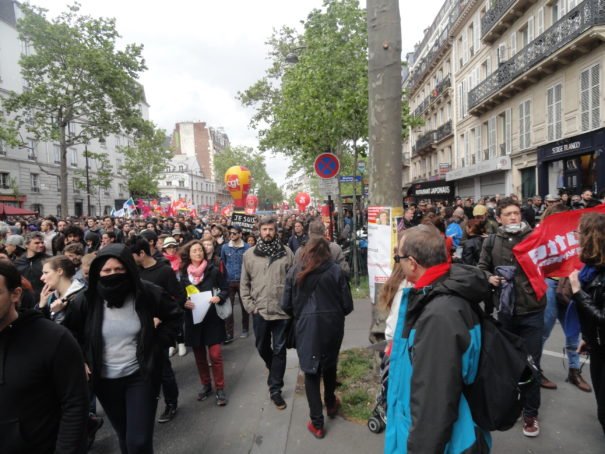
Should the Revolution Be Fun?

Should the Revolution Be Fun?
Beer in Paris
The black-clad cops crouched and walked backwards slowly, their faces shielded, their bodies taut in readiness. The first line of marchers approached them, a 30-foot distance between the two groups. It felt like watching one of those iconic protester-cop face-off pictures come alive.
On May 1, when thousands of people marched from the Place de la Republic to the Place de la Bastille in Paris, they were upholding a hoary tradition of protest. But given that the presidential election was later that week, this year’s march came with a topical twist: lambasting Emmanuel Macron and Marine Le Pen, the remaining candidates on the ballot. White vans slowly chugged alongside the slogan-shouting, placard-carrying men and women. One showed Le Pen as the devil, Macron as an alien. Another described them both as the plague.
A friend who had come to help translate as I wrote a story about the protesters stopped beside one of the slow-moving vehicles an hour after scurrying around talking to people.
“Time for beer,” said Audrey decisively as we jogged up to one of the vans. Heinekens were procured for two euros apiece. We cracked the tabs open, and the beer hissed back.
That rather slowed down progress on the reporting front. A beer in one hand and a notebook in another is not a good look. Neither is it a practical one.
After a few bracing swigs I passed my can back to Audrey, who was once again thrust back into translation duties. I caught up with a member of the feminist group Femen. Normally their style is topless protesting; today, they were fully clothed and fully shod. Their vocal game was still very good. “Le Pen promotes xenophobia and homophobia and is totally not a feminist,” said Sophia Antoine, 38, an activist with the group.
Further ahead, firecrackers periodically ripped through the air. Every now and then, a cloudburst of color would erupt; little plumes of pink and orange.
A Sri Lankan group walked past, urgently drawing attention to the violence in their country. A band of refugees trudged on. Balloons bobbed through the moving sea of humanity and soapbox-style histrionics surfaced from time to time on the marching route. There were rainbow flags and French flags and Europe flags.
From somewhere there was music, and despite the grimness of the political sloganeering, no one was going home without a party. And what a well-lubricated party it was. As we walked through the marching route all the way up to the Bastille, the trash kept gathering on the streets: posters, placards and discarded cans of beer.
“The revolution has to be fun,” said Audrey, when we reached Bastille and surveyed the mess around us, “or the people won’t come.”